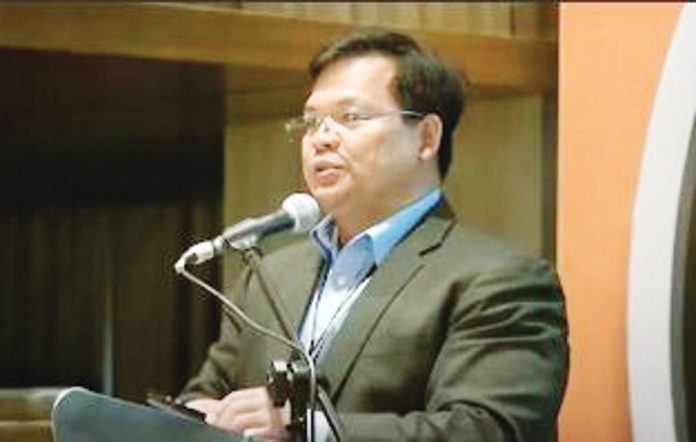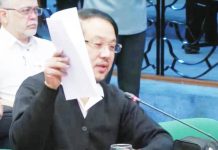
THE new chief of the Energy Regulatory Commission (ERC) has expressed readiness to engage in a productive dialogue with the consumers, whether through the formal consultative processes established at the ERC or through other channels.
This comes after a protest held by members of the Power for People Coalition (P4P) outside the ERC office on September 19.
“Last week, members of the P4P Coalition convened downstairs to articulate their perspectives on various issues within the power sector. I welcome such forms of engagement with our most important stakeholders — the consumers,” said ERC chairman Francis Saturnino Juan in a statement released on Thursday, September 25.
P4P, during their protest, slammed the ERC for its proposed new rules in the bidding process of bilateral power procurement and transmission ancillary service contracts. “We are disappointed that Chair Saturnino Juan’s first order of business as new ERC chief is to cede ground to power players, enabling them to raise prices as they please at the expense of ordinary Filipinos. Protecting consumers’ interests is not an optional duty for the ERC. It is its primary mandate – and part of that responsibility is scrutinizing these contracts to prevent abuses and ensure least cost electricity,” said P4P Convenor Gerry Arances in a press release dated September 19.
“Please allow me to address this comment. Let me be clear, this is my personal stand on the issue: We are entering a new era, characterized by two pivotal developments in the regulatory framework: the Department of Energy’s (DOE) Competitive Selection Process (CSP) Policy and the Supreme Court’s landmark decision in Alyansa ng Bagong Pilipinas vs. ERC. These are not merely procedural changes; rather, they represent a significant transformation, a compelling call to re-embrace the competitive principles that are fundamental to the Electric Power Industry Reform Act (EPIRA),” Juan stressed.
In this new era, the role of the ERC is not diminished; it is transformed. Its mandate is clearer and more critical than ever: to be the guardian of the competitive process and the guarantor of its integrity, he further said.
The CSP is the engineered mechanism designed by the DOE to fulfill EPIRA’s pro-competitive mandate. It is a transparent, public, and competitive bidding where distribution utilities seek the least-cost power supply to serve their captive consumers. It is designed to discover the true, fair market price through the forces of supply and demand, not through closed-door negotiations.
The ERC’s primary duty in its rate-setting function must be to uphold the outcomes of a genuinely competitive CSP.
“When a CSP has been conducted properly — transparently, fairly, and with robust competition — the resulting price is not just a number offered by a generator. It is the market’s definitive answer to the question, ‘What is the least-cost power available today?’ It is a price validated by the competitive process itself,” Juan said.
To then second-guess this outcome and unilaterally reduce this contracted rate under the guise of regulatory review risks undermining the entire foundation of the competitive market we are all trying to build and promote. It creates regulatory uncertainty that discourages the very investment we need. It tells investors: “You competed and won fairly, but the goalposts may still move during the PSA review process at ERC.” This does not protect consumers; it ultimately harms them by chilling investment, threatening future supply, and jeopardizing the long-term reliability and affordability of our power.
“This is not to say the ERC should rubber-stamp every PSA. Its mandate remains crucial. The Commission must vigorously ensure that the CSP process itself was truly competitive and compliant. It must scrutinize the terms for prudence, ensure the costs pass through the filters of reasonableness, and disallow any illicit or anti-competitive behavior,” said Juan.
He continued: “But once it is established that the process was fair and the costs are just and prudent, the regulator must have the courage to trust the market it was mandated to create and promote. Upholding a competitively derived price is the highest form of consumer protection—it protects consumers from the hidden costs of uncertainty, underinvestment, and the return of negotiated monopolistic rates.”
This balanced approach is the essence of EPIRA. It harmonizes two pillars: promoting competition and ensuring cost recovery.
“To our stakeholders, compete fiercely, innovate constantly, and invest confidently in the knowledge that a fair process will yield a fair and enforceable outcome. To the P4P officials and all consumers we all ultimately serve, I say: the greatest shield against high prices is not the discretionary power of a regulator to cut a single contract, but the relentless, ongoing pressure of a competitive market where suppliers must constantly offer their best price to win a supply contract. That is the system the CSP and the Alyansa Supreme Court ruling protects,” Juan said.
The ERC chief added: “The path is clear. The law is certain. Let the ERC be the steadfast guardian of the competitive process. Let it validate the integrity of the auction, and then let it uphold the results. In doing so, we will secure a future of affordable, reliable, and sustainable power for all Filipinos.”/PN







